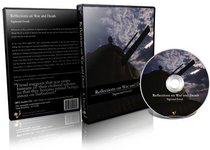Search -
Reflections on War and Death
Reflections on War and Death
Author:
Reflections on War and Death, by Sigmund Freud, is an essay Freud wrote during the Great War (World War I) in which he discusses the impact the war has had on how it has changed the way people view the world and death. The essay is not considered to be a part of Freuds major canon of work; however, it gives important and interesting insight into... more »
Author:
Reflections on War and Death, by Sigmund Freud, is an essay Freud wrote during the Great War (World War I) in which he discusses the impact the war has had on how it has changed the way people view the world and death. The essay is not considered to be a part of Freuds major canon of work; however, it gives important and interesting insight into... more »
ISBN-13: 9781775420132
ISBN-10: 1775420132
Rating: ?
ISBN-10: 1775420132
Rating: ?
0 stars, based on 0 rating
Publisher: IDB Productions
Book Type: Audio CD
Other Versions: Paperback
Members Wishing: 0
Reviews: Amazon | Write a Review
Book Type: Audio CD
Other Versions: Paperback
Members Wishing: 0
Reviews: Amazon | Write a Review




